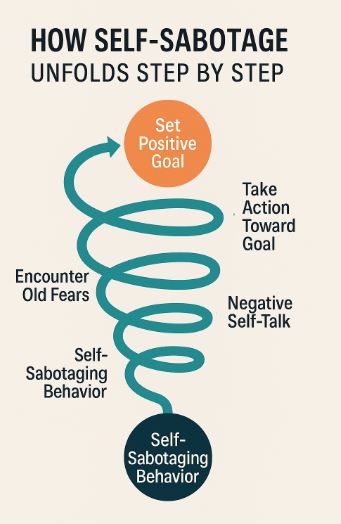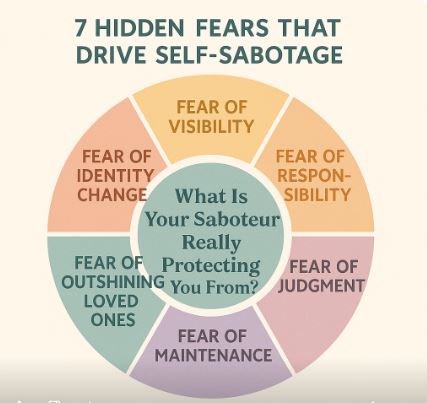Self-Sabotage: Why We Get in Our Own Way
You set intentions. You make plans. You start strong. Then just when things start working out, you do something that wrecks everything. Self-sabotage isn’t about lacking willpower, it’s your brain thinks it’s protecting you from something dangerous about success.
How Your Brain Creates Self-Sabotage Without Permission
 We’d like to think we are in control, but how about, your colleague, she builds her freelance business for eight months. She has steady clients, good income flows in regularly, then right before landing her biggest contract ever, she picks a fight with the potential client. She loses the deal completely.
We’d like to think we are in control, but how about, your colleague, she builds her freelance business for eight months. She has steady clients, good income flows in regularly, then right before landing her biggest contract ever, she picks a fight with the potential client. She loses the deal completely.
Most people think self-sabotage involves dramatic destructive behaviors, but it usually shows up as reasonable decisions that just happen to prevent success from occurring. The psychology of self-sabotage works below conscious awareness.
Your unconscious mind gets incredibly creative. It finds ways to avoid outcomes it considers threatening. Self-sabotage rarely feels like sabotage in the moment, it feels like logical responses to current circumstances, yes that’s correct.
Maybe you suddenly become too busy to follow up. Perhaps you find flaws in plans that were working perfectly. You might create conflicts with people who could help you succeed. Your brain provides excellent reasons for each one of these.
It tells you that you’re not being irresponsible, you’re being realistic about potential problems. You’re not avoiding success, you’re being careful about quality standards. The pattern only becomes clear when you step back and notice the consistency.
Your nervous system doesn’t distinguish between physical and emotional threats. Fear of judgment activates the same responses as actual danger. Fear of failure triggers fight-or-flight responses and fear of increased responsibility creates stress reactions.
When this happens, your brain’s priority shifts completely. It moves from achieving goals to avoiding perceived threats. It switches to survival mode.
The Hidden Psychology Behind Why We Self-Sabotage
 Most self-sabotage stems from unconscious fears. Fears about what success might cost you, fears about what success might require from you. Your mind creates obstacles to avoid outcomes that feel more threatening than remaining stuck.
Most self-sabotage stems from unconscious fears. Fears about what success might cost you, fears about what success might require from you. Your mind creates obstacles to avoid outcomes that feel more threatening than remaining stuck.
Fear of increased visibility drives many people to sabotage breakthrough moments. Success often means more attention and more scrutiny and more expectations from others. For people who prefer staying under the radar, this feels dangerous.
Fear of responsibility triggers self-sabotage when goals require leadership roles. When goals require making decisions that affect other people, the weight of potential consequences feels overwhelming. Your brain creates reasons to avoid the position entirely.
Fear of changing identity causes problems when success requires becoming someone different. If you see yourself as someone who struggles, achieving goals threatens this familiar self-concept. The psychology of self-sabotage protects your existing identity.
Fear of outshining others leads to problems when success might make family members feel bad. When it might make friends feel bad about their own lives. So your brain protects relationships by keeping you at the same level as people you care about.
Fear of not belonging triggers responses when success moves you into new social circles. Into professional environments where you worry about fitting in and worry about being accepted by different types of people.
Fear of maintaining success causes people to sabotage because they doubt their ability to sustain positive outcomes. It feels easier to fail now than to risk failing later when more is at stake.
These fears operate largely below conscious awareness. That’s why self-sabotage feels confusing and inexplicable. The behaviors don’t make logical sense, but they make perfect emotional sense to a brain trying to avoid perceived dangers.
Psychologists explain that self-sabotage is often a subconscious attempt to stay safe, avoid failure, or maintain familiar emotional patterns. Read more about why we self-sabotage on Psychology Today.
Why Self-Sabotage Feels Like Protection
 Your unconscious mind developed these patterns as solutions to real problems you faced earlier in life. Understanding this helps explain why these behaviors persist, even when they no longer serve you effectively.
Your unconscious mind developed these patterns as solutions to real problems you faced earlier in life. Understanding this helps explain why these behaviors persist, even when they no longer serve you effectively.
Children who were criticized for standing out often develop patterns around visibility. Their brain learned that attention leads to judgment. So it creates ways to avoid success that would make them noticeable.
People who experienced trauma around responsibility might sabotage leadership opportunities. Their nervous system remembers that having power led to pain and that having control led to overwhelm in the past.
Family systems that couldn’t handle one member’s success often create patterns around achievement. The person learns to limit their own potential so to maintain family harmony and belonging.
Perfectionist environments can create problems around completion and follow-through. If nothing ever feels good enough, it becomes easier to leave things unfinished than to risk judgment about imperfect results.
These patterns feel protective because they prevent experiences that once caused real pain. Your brain doesn’t automatically update its threat assessment when circumstances change, it keeps running old programs designed for different situations.
The psychology of self-sabotage maintains emotional equilibrium. It does this by keeping you in familiar territory, even when that territory is limiting or painful. The discomfort of staying stuck feels safer than the uncertainty of growth.
This is why logic and willpower rarely overcome these patterns. You’re not fighting against random destructive impulses, you’re actually fighting against protective mechanisms that your brain believes are keeping you safe from real dangers.
Common Ways Self-Sabotage Shows Up in Daily Life
Self-sabotage manifests through seemingly normal behaviors that consistently prevent positive outcomes from occurring. This happens in your career, relationships, and personal goals.
Procrastination on Important Tasks
You put off work that could advance your career. You put off projects that could improve your life. You find urgent distractions when deadlines approach. You leave important projects until the last minute.
This ensures rushed, suboptimal results that don’t reflect your actual capabilities. This form protects you from the vulnerability of putting forth your best effort and potentially having it rejected or criticized.
Healthier alternative: Set “good enough” standards before starting any project. Define what constitutes completion and stick to those standards.
Perfectionism That Prevents Completion
You set impossibly high standards that guarantee nothing ever feels finished or ready to share. You revise work endlessly without moving toward completion. You research extensively without taking action on what you’ve learned.
This protects you from judgment by ensuring nothing you produce can be evaluated fairly. If it’s not finished, it can’t be criticized. Your potential remains safely theoretical through the psychology of self-sabotage.
Healthier alternative: Practice sharing imperfect work to build tolerance for normal human limitations and feedback.
Creating Conflict Before Success
You pick fights with mentors right when their help could lead to breakthrough moments. You pick fights with collaborators or supporters. You find reasons to be dissatisfied with opportunities that could advance your goals.
This protects you from the anxiety of depending on others and it protects you from feeling indebted to people who help you succeed. It also prevents the vulnerability of accepting support that might be withdrawn later.
Healthier alternative: Practice expressing gratitude and appreciation to people who support your growth and success.
Breaking Free from Self-Sabotage Cycles
 Overcoming self-sabotage requires strategies that address both the unconscious fears and the automatic behaviors. You need to work with both the psychology of self-sabotage and its manifestations.
Overcoming self-sabotage requires strategies that address both the unconscious fears and the automatic behaviors. You need to work with both the psychology of self-sabotage and its manifestations.
Develop awareness of your personal patterns first. Notice when self-sabotage typically occurs. is it right before deadlines, after positive feedback, when opportunities arise? Recognizing your specific triggers is essential for intervention.
Question the stories your mind creates. When you find yourself avoiding opportunities, ask specific questions. “What am I afraid will happen if this succeeds?” Often the fears driving these patterns become less powerful when examined directly.
Start with smaller risks before tackling major objectives. Practice tolerating success-related anxiety with lower-stakes goals. Build confidence in your ability to handle positive outcomes gradually.
Address underlying beliefs about success systematically. Examine whether you believe you deserve good things, whether you can handle responsibility, whether you belong in successful environments. Work to heal beliefs that make achievement feel dangerous.
Create support systems for growth intentionally. Surround yourself with people who celebrate your success and people who don’t feel threatened by your achievements.
Practice self-compassion during setbacks consistently. When you catch yourself engaging in these patterns, respond with curiosity. Understanding the psychology of self-sabotage helps change patterns more effectively than criticizing yourself.
Develop emotional regulation skills deliberately. Learn to tolerate the anxiety that often accompanies growth and success.
Seek professional support when needed. Persistent patterns often connect to deeper psychological issues. These benefit from therapy or coaching specialized in helping people overcome success blocks.
Conclusion
Self-sabotage isn’t a character flaw or sign of weakness. It’s a protective mechanism that developed when your brain learned that success led to pain, overwhelm, or rejection. The psychology of self-sabotage serves important functions, even when it’s no longer appropriate.
Understanding the fears and beliefs driving your patterns is the first step toward developing healthier responses to opportunities and success. Your brain can learn that achievement is safe when you provide evidence through small, positive experiences.
The same mental mechanisms that create these patterns can support your goals when directed consciously. With awareness and practice, you can retrain your unconscious mind.
Start by identifying one area where these patterns have been most active. Notice the fears underneath the behaviors. Experiment with small steps toward success while managing the anxiety that arises naturally.
The Hidden Pain Behind Toxic Traits: Where They Come From (Part 2)






